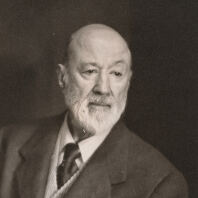Charles Ives
Composer
Charles Ives was a musical visionary who, without models, experimented with quarter tones, cluster sounds, complex metric layering and quotation collages. Unnoticed by the musical public, he composed revolutionary works which “just collected dust” until he was hailed as the founder of an independent American musical art from the mid-1950s onwards.
Charles Ives, born in Danbury, Connecticut in 1874, received a sound musical education from his father, an experimental musician who had conducted a Union Army brass band during the American Civil War. Ives also studied composition under Horatio Parker at Yale University, but then decided against the financially unpredictable existence of an artist to become an employee of a New York insurance company. In 1906, Ives founded his own agency, which in 1909 became Ives & Myrick, for many years the most successful life insurance agency on the East Coast. After more than twenty years of maintaining a double life as a hard-working businessman and a composer who wrote frantically in every spare moment, Ives suffered his first heart attack in 1918. Only then did he begin to sift through and partially complete his countless sketches and drafts before ending his composing career around 1923. His works were still hardly performed – with the exception of the first two movements of his highly complex Fourth Symphony by Eugène Goossens in New York in 1927, and a few songs and shorter orchestral pieces in the 1930s. Then in 1939, the musicologist and pianist John Kirkpatrick caused a sensation when he premiered Ives’s monumental Concord Sonata – an event that marked the beginning of the real discovery of Ives’s musical works. One year after the premiere of the Third Symphony “The Camp Meeting”, which took place in New York in 1946, Ives was awarded the coveted Pulitzer Prize. Today he is considered one of the foremost composers of his time.